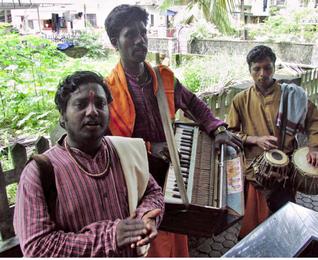Veshadharis’ Vying for Survival Continues With the Donning of a New Avatar

MANGALORE: In the era of television, mobile phones and internet, a few families that migrated to the city from North Karnataka, are keeping alive the ‘Veshadhari’ tradition in Mangalore, albeit in its new avatar.
Having migrated to the city some two decades ago, unable to support their families back in their own regions, they visit houses in groups, render bhajans and collect whatever is offered – money, grains, and clothes.
They have become a part of the Mangalore milieu. One of the troupes performed in 2010 at Alava’s Nudisiri, a premier cultural festival of the region. The troupes are frequently invited to perform at temples and in marriage functions.
Decades ago Veshadharis – mainly belonging to Budagajangama – a nomadic scheduled tribe – were a regular feature in villages of North Karnataka. Each family would go to same villages during harvest seasons every year and perform various episodes from Ramayana and Mahabharata. While a couple of them would wear costumes of characters chosen for the day – Rama and Hanumantha for example – the remaining members provided background music on tabla and harmonium.
New look
In its modern version, they no longer dress as mythological characters. The ‘veshadharis’ – the term actually means ones who don different costumes – have now been reduced to the status of a music troupe. The troupe of Mr. Raamesh B., originally hailing from Shirahatti in Gadag district, visited many houses in Ashoknagar on Friday, singing mainly bhajans of Purundaradasa, which “are popular among Mangaloreans.”
Mr. Raamesh and his fellow musicians Chennappa Veshadhari (tablist) and Mariswamy (harmonium player) said some Mangaloreans liked Meera Bhajans and Marathi bhajans, which they can sing on request. However, they flatly refuse to sing film songs, despite requests from youngsters. However, they do not mind presenting famous devotional songs from Rajkumar films such as ‘Bhaktha Kumbara’.
Mr. Mariswamy, who hails from Haveri district, says the younger generation of the tribe was no longer interested in pursuing the tradition. He thinks their generation is the last one following it. All the three have inherited for the last three generations at least.
The troupe members, who don't have a formal training in music, could be pardoned for their improper diction but youths, more tuned to TV and mobile phones, hardly showed interest. On a given day, they collect Rs. 500 to Rs. 1,500.
Evacuated from a site where 21 families that had pitched tents in Yekkur a couple of years ago, the families are now scattered across the city.
Mr. Raamesh and four other families are staying on the premises of a factory in Padil. “They have given us the space free of cost but we have to vacate the moment they want us to,” Mr. Raamesh says.
Source: The Hindu, DT. June 15, 2013.







